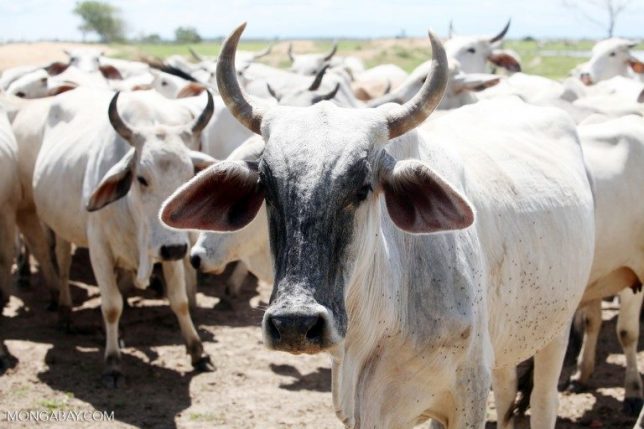
Why don’t we have any proper system of environmental law?
By David Renton, The Ecologist (CC BY-NC-ND 4.0).
A series of legal rights has emerged in recent years as if from nothing, and each has become thickened with all sorts of rules and exceptions.
It used to be that the only employment law was, in practice, the law relating to strikes. Half a century later, we have a generalised system of individual employment law.
The main book collecting employment law regulations runs to a tightly-printed 3,000 pages and weighs over two kilogrammes.
Extinction
We did not use to have any information law: now we have the Data Protection Act, the Freedom of Information Act, a specialist enforcement body and an appeals tribunal.
Immigration law has grown from a tiny area, the reserve of a few dozen specialists to provisions so complicated that even the judges complain.
“Immigration law is a total nightmare,” said immigration judge Nicholas Easterman in 2017. “I don’t suppose the judges know any more about it than the appellants who come before them.”
But while these areas have grown, environmental law has seen no similar expansion.
In Britain there is still no system of environmental law despite half a century of growing public awareness of environmental degradations, of species extinction and the poisoning of the rivers and seas.
Regulating
We have hints of it: in the criminal law for example, when lawyers defend protesters.
When central or local government makes a decision which has an environmental impact that decision can be judicially reviewed in the High Court.
The First-Tier Tribunal contains an Environmental Chamber which hears appeals by business after they have been fined under regulations dealing with eco-design, single user carrier bags, waste, etc.
But these hints fall short of constituting a proper system of environmental justice, in which the people who pollute and poison our world can, for example, have their property removed from them.
Often the problem is said to be one of “standing”. In other words, that unless and until trees and mountains can sue in their own name, then no-one will be able to restrict the decisions made by government in planning and regulating industry.
Interference
And it is true that this absence hampers lawyers: destroy a creature’s habitat and the harm to them will aways be greater than the second-hand suffering done to the people who care for nature.
Yet, standing is only a part of the problem. Over the past 25 years, the group of charities who have been empowered to bring judicial review cases has widened. But it remains true that most such claims are brought, fought hard, and lost.
Until we can sue and expropriate the worst of the polluters, it is hard to see how business will feel any pressure to change.
The answer is not a cadre of judges willing to be bolder in their application of judicial review. For that is a remedy against government.
And most damage to the environment is done by businesses rather than the state, and if a company pollutes the air or the water or contributes to global warming, the citizen has almost no meaningful redress against them.
More than a century ago, Victorian judges developed the idea of a private nuisance, a harm which happens when one person causes an unreasonable interference to the use and enjoyment of a person’s property.
Neoliberalism
Yet a claim in nuisance cannot only be brough by a landowner. Imagine, the owner of a commercial forest which has been damaged by acid rain. Who would the owner sue?
The time between an act of environmental destruction and its consequences may be protracted. The distance between the release of a pollutant and the harm it causes may be hundreds of miles. What, if the polluter is outside the United Kingdom? Nuisance assumes that pollution is incapable of crossing borders.
After fifty years of growing public consciousness we should have – but no court has actually recognised – a system of economic wrongs – “torts” – done against nature, and a series of remedies including both compensation and confiscation.
Only then would there be the intellectual infrastructure so that claims brought in the name of trees or mountains would have effect. But that would only be the first step. And its creation now would be too late.
The irony is that for the last forty years, we have lived through a political moment – “neoliberalism” – which has been open to the creation of new laws.
Right
Under neoliberalism, the whole of existence is understood as an opportunity for the creation of markets – in water, in housing, in utilities – which require rules and people to enforce them.
No mechanism has been accepted for changing how business behave, except through market creation, and business regulation and reward. The vast majority of people are left out of these dynamics.
Think of the European Union Emissions Trading System (EEUTS), the main policy mechanism of the EU for resisting climate change which was set up in 2005 to use market solutions to prevent global warming.
Although this is “European law”, UK politicians enthusiastically supported these proposals. On Britain’s departure from the European Union, a UK Emissions Trading Scheme was drawn up, closely modelled on it.
The idea was that 10,000 or so factories, power stations, and similar companies responsible for around half the EU’s CO2 emissions would each be permitted a certain maximum volume of greenhouses gases which they could release. If they wanted to produce more than their cap, they would have to buy the right to produce extra carbon.
Punishment
States give companies a carbon budget which they are entitled to trade. The scheme has therefore worked via a series of subsidies to business – like so much supposed regulation in recent years.
Companies have been provided with an asset – a hypothetical entitlement to produce greenhouse gases – which they can sell on the market.
So, between 2008 and 2015, cement producers were gifted between over 5 billion euros of windfall profits; and this to the European representatives of a commercial sector which produces one in twelve of all carbon emissions worldwide.
The point was not to prevent emissions but to enrich those who held property. An OECD report found in 2018, that the firms within the scheme had on average 16 percent more fixed revenues than they would have had they never been regulated.
The scheme has been widely criticised: initially for oversupplying emissions allowance, causing the price of carbon so low that there was no punishment for polluters.
Cement
It has incentivised false accounting: by rewarding companies which make promises to plant trees – even if there is no prospect of them being planted, or to invest in technology to suck carbon out of the atmosphere, even where that technology does not exist; or by buying up the nominal credits arising from the legacy of old industrial technologies and washing them through the system repeatedly, in order to allow business to keep on expanding.
The verdict on the EEUTS appears to be that it caused a one-off reduction of around ten percent in European carbon emissions but that, despite repeated attempts to tighten it, the scheme has diminishing effect every year.
A fall of ten percent in carbon emissions is not to be dismissed; but the EU’s carbon reduction goal is to reach 40 percent within eight years.
The problem with the EEUTS, and with its British counterpart, is that there is no mechanism for the citizen to complain, say, if a cement company misses its carbon targets.
Polluters
It is left to the same governments to enforce which ignore commercial fraud and money laundering, which prosecute people who are overpaid welfare benefits but refuse to prosecute businesses when they have taken millions in grants to which they were not entitled.
Under the EEUTS and under all the Regulations made over the past 40 years, mere voters are not parties to the litigation; we cannot demand that a business be fined or have its property taken away because of its reckless stewardship of its environmental resources.
Perhaps there is a debate to be a had about whether we as a society truly want to make citizens enforcers. There are things to be learned from the way in which employment law has grown at just the same time that trade union have been weakened, a balance is needed between the law and social movements.
But until we can sue and expropriate the worst of the polluters, it is hard to see how business will feel any pressure to change.


